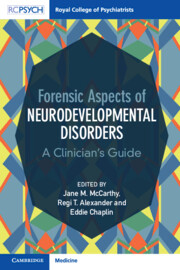Book contents
- Forensic Aspects of Neurodevelopmental Disorders
- Forensic Aspects of Neurodevelopmental Disorders
- Copyright page
- About the Cover Page
- Contents
- Contributors
- Foreword by the Rt Hon Lord Bradley
- Terminology Used in the Book
- Section 1 An Overview: Definitions, Epidemiology and Policy Issues
- Section 2 Assessment and Therapeutic Approach
- Section 3 Criminal Justice Pathways and Legal Issues
- Chapter 16 Criminal Justice Pathways and Neurodevelopmental Disorders
- Chapter 17 The Mental Health Act and Other Relevant Legislation in Relation to Neurodevelopmental Disorders in the UK
- Chapter 18 Fitness to Plead and Neurodevelopmental Disorders
- Chapter 19 Fitness to Plead Procedures in Relation to Mental Health and Capacity Legislation
- Chapter 20 Forensic Services for Neurodevelopmental Disorders: An English Perspective
- Chapter 21 Offenders with Neurodevelopmental Disorders in Four Nordic Countries
- Chapter 22 Forensic Neurodevelopmental Disabilities: A Perspective from Ontario, Canada on Pathways and Services
- Chapter 23 Forensic Aspects of Neurodevelopmental Disorders: An Australasian Perspective
- Chapter 24 Concluding Comments
- Index
- References
Chapter 20 - Forensic Services for Neurodevelopmental Disorders: An English Perspective
from Section 3 - Criminal Justice Pathways and Legal Issues
Published online by Cambridge University Press: 18 May 2023
- Forensic Aspects of Neurodevelopmental Disorders
- Forensic Aspects of Neurodevelopmental Disorders
- Copyright page
- About the Cover Page
- Contents
- Contributors
- Foreword by the Rt Hon Lord Bradley
- Terminology Used in the Book
- Section 1 An Overview: Definitions, Epidemiology and Policy Issues
- Section 2 Assessment and Therapeutic Approach
- Section 3 Criminal Justice Pathways and Legal Issues
- Chapter 16 Criminal Justice Pathways and Neurodevelopmental Disorders
- Chapter 17 The Mental Health Act and Other Relevant Legislation in Relation to Neurodevelopmental Disorders in the UK
- Chapter 18 Fitness to Plead and Neurodevelopmental Disorders
- Chapter 19 Fitness to Plead Procedures in Relation to Mental Health and Capacity Legislation
- Chapter 20 Forensic Services for Neurodevelopmental Disorders: An English Perspective
- Chapter 21 Offenders with Neurodevelopmental Disorders in Four Nordic Countries
- Chapter 22 Forensic Neurodevelopmental Disabilities: A Perspective from Ontario, Canada on Pathways and Services
- Chapter 23 Forensic Aspects of Neurodevelopmental Disorders: An Australasian Perspective
- Chapter 24 Concluding Comments
- Index
- References
Summary
This chapter describes the development and delivery of hospital inpatient services and community services for those with neurodevelopmental disorders with a focus on services for those with intellectual disability in England. The tired model of service provision is described with Tier 1 to Tier 3 being community-based services and Tier 4 as all types of specialist inpatient services. Within Tier 4 services, there are six categories of services that ranging from high secure to long-term rehabilitation inpatient units or to highly specialised units provided at a national level such as those for autistic people. Autistic patients admitted to forensic in-patient care are a heterogenous group with complex needs. Developing forensic services for people with neurodevelopment disorders requires all relevant stakeholders to be involved using a care pathway-based approach addressing key elements such as the environmentand be person centred so that treatments are tailored to the individual needs of the patient. Future services both in the community and within hospital setting will need to be flexible to meet changing needs and demands.
Keywords
- Type
- Chapter
- Information
- Forensic Aspects of Neurodevelopmental DisordersA Clinician's Guide, pp. 240 - 251Publisher: Cambridge University PressPrint publication year: 2023

